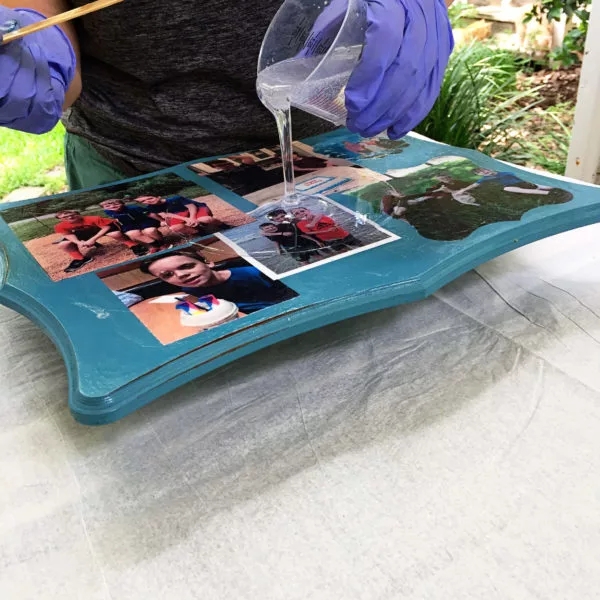
Splendid. Awesome. Dope. (Fun fact — dope doesn’t mean weed anymore.)
But first, I need to know what you mean by use.
Do you want to mix resin outdoors instead of mixing it indoors?
Yes, you can mix and pour resin outside. I do it frequently during the summer. Nature provides the best ventilation. Plus, I’m a wanderer, which means that I like to walk around a bar-height table. I don’t have an indoor space to do that, but I have a shady, level space where I can do that outside.
But, before you mix resin outdoors, here’s what you need to know.
Your resin needs to be warm the entire curing time. That means your ambient temperature shouldn’t dip below 70F while drying. The ambient temperature is important for maintaining the resin heat so it cures hard. But…
Temperatures above 78F will shorten your resin’s pot time. So while it’s great to have the built-in heat of summer, there is too much of a good thing. You’ll notice your resin thickening quicker than it does when it’s not so warm.
View this post on Instagram
If you’re pouring resin outside to escape the cat hair (true story), you’ll have other things to worry about. Like leaves. And bugs. Or someone throwing a tarp over your wet resin (also true).
Do you want to make something with resin, then display it outside?
In a simple answer, yes.
Still, it doesn’t mean you should.
Here’s why it’s good to use epoxy resin outside.
You can use resin as glue. It’s a strong adhesive, plus it’s waterproof.
It’s also very durable. It’s why you can use it on floors.
And it’s used a lot in the marine industry for boat repair. (Side note — here’s why you don’t want that cheap epoxy for your resin crafts)
But if you’re not doing one of these tasks, here’s why you don’t want to use it outside.
All resins yellow with time.
That means your crystal-clear epoxy will look like a specimen from a doctor’s office at some point. It could be weeks to months before this happens, but it will happen.
Resin is not forgiving of hot temperatures.
That means it will soften and get bendy with the heat. Also, if your resin is attached to metal, it can melt (yet another SAD, true story).
Epoxy expands and contracts at different rates than other substances.
It’s why when you use resin with glass, it can crack. Extreme weather changes make resin cracking more likely.
If you don’t use a hard curing resin, your project will scratch.
You’ll need to recoat it eventually.
If you still want to use epoxy in an outdoor project, ensure it’s in the shade, and don’t leave it outside in the cold winter.
And here are some other tips for protecting your art.
Have more questions besides using resin outdoors?
For less than the cost of a resin kit, you can get the ebook Resin Fundamentals. I wrote it for resin novices to get you to expert status in only a couple of hours. Buy the PDF book now and get a download link in minutes.
Unpublished Blog Posts of Resin Obsession, LLC © 2023 Resin Obsession, LLC




